
News
Behind the Headlines
Two-Cents Worth
Video of the Week
News Blurbs
Articles
Testimony
Bible Questions
Internet Articles (2015)
Internet Articles (2014)
Internet
Articles (2013)
Internet Articles (2012)
Internet Articles (2011)
Internet Articles (2010)
Internet Articles
(2009)
Internet Articles (2008)
Internet Articles (2007)
Internet Articles (2006)
Internet Articles (2005)
Internet Articles (2004)
Internet Articles (2003)
Internet Articles (2002)
Internet Articles (2001)

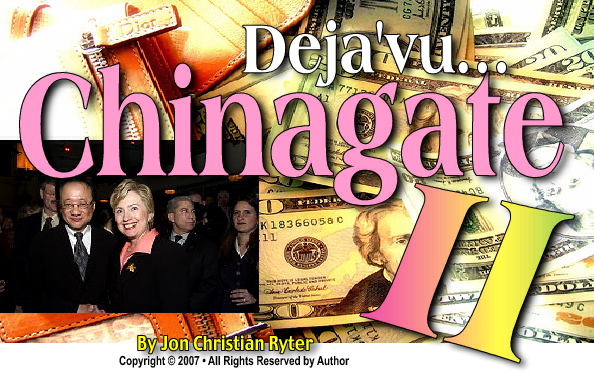
Author's note: Shortly after the inauguration of Texas Gov. George W. Bush as America's 43rd president I received a telephone call from a well-known political operative who was, at that time, being cultivated by the Bush-43 White House as an information conduit to the media for the new administration. He said: "Hillary Clinton is taking money from China." He couldn't have shocked me more if he said: "The sun rises every morning." In other words, what else is new? He added: "[New Mexico Gov.] Bill Richardson hand-carried a letter to Hillary from China." And what, I asked, was in the letter? I was told it was a pledge of financial support for her presidential bid in 2008. "Get me a copy of the letter and I'll use it," I told him. The "letter" never arrived. I never mentioned it—nor the conversation with the political operative—to anyone when Bush came up for reelection in 2004 or when Hillary was reelected to the US Senate in 2006.
As the Bush-43 years sped by, the Clintons and the Bushes became closer personally and politically. I found myself wondering if that letter actually existed. Nevertheless from as early as 2001, I personally believed that Hillary Clinton would fish for 2008 presidential campaign contributions in Chinese waters. Whenever you go trawling, logic suggests you always cast your net in the waters you know best.
 he
communist regime in Beijing—out of fear of President Ronald
Reagan—began to covertly fund the election campaigns of
liberal US Democrats in the early 1980s, funneling illegal money
to anti-Reagan candidates through Sen. Alan Cranston [D-CA]—who
became the disbursement agent—after first laundering the money
through the Democratic Senatorial Campaign Committee to make
it squeaky-clean. Beijing
desperately wanted Reagan defeated in 1984. So did the Democrats.
However, Reagan was reelected in the biggest landslide in
American history since James Monroe's 1808 victory over John
Quincy Adams when he won all but one electoral vote.
he
communist regime in Beijing—out of fear of President Ronald
Reagan—began to covertly fund the election campaigns of
liberal US Democrats in the early 1980s, funneling illegal money
to anti-Reagan candidates through Sen. Alan Cranston [D-CA]—who
became the disbursement agent—after first laundering the money
through the Democratic Senatorial Campaign Committee to make
it squeaky-clean. Beijing
desperately wanted Reagan defeated in 1984. So did the Democrats.
However, Reagan was reelected in the biggest landslide in
American history since James Monroe's 1808 victory over John
Quincy Adams when he won all but one electoral vote.
In 1978 James Riady, son of Indonesian industrialist-banker Mochtar Riady (who had close personnel ties with the Chinese People's Liberation Army) met with then Gov. Bill Clinton, Wilton "Witt" Stephens, head of Stephens, Inc., a Little Rock investment company, and Stephens "handyman" Larry Nichols in a back booth of Charlie Trie's Little Rock restaurant. Riady and Stephens had a pocketful of wishes to exchange.
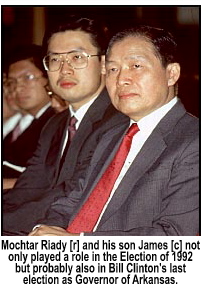 China
was suffering from the worst rice crop shortages in recent memory
and needed that food staple. Stephens wanted to sell rice
to China through an Arkansas agricultural cooperative market, Riceland
Foods. Riceland would be supplied by a farmers coop called
Rice Farmers of America. In return for his intercession with
the People's Republic of China [PRC] on behalf of Stephens,
Mochtar Riady wanted only one small favor from Stephens.
Riady wanted to own a bank in the United States.
China
was suffering from the worst rice crop shortages in recent memory
and needed that food staple. Stephens wanted to sell rice
to China through an Arkansas agricultural cooperative market, Riceland
Foods. Riceland would be supplied by a farmers coop called
Rice Farmers of America. In return for his intercession with
the People's Republic of China [PRC] on behalf of Stephens,
Mochtar Riady wanted only one small favor from Stephens.
Riady wanted to own a bank in the United States.
James Riady planned to use this new bank to finance a few American ventures. (More likely than not the purpose of the new bank was to give the LippoGroup a way to launder Chinese political seed money—contributions to the right types of political candidates to guarantee Jimmy Carter's reelection and to expand the Democratic majority in Congress.) Stephens purportedly assured Riady that since he already owned the governor, it would easy to arrange—except for one small problem. Riady was a resident alien and not an American citizen. He could not own a bank charter in the United States. Stephens would need an American front man to apply for the charter.
Stephens had a man he could trust, a former Green Beret named Larry Nichols. Nichols would join the Clinton team as a key strategist in 1982. But, for the moment, he was Witt's boy. On the bank charter application appeared Larry Nichols' signature. Below it, as an officer of the new corporation, was the signature of James Riady.
James Riady got his bank. Stephens got his rice deal. Bill Clinton got his connection to the PRC through the LippoGroup. And Larry Nichols' got his windpipe crushed when he began to expose Bill and Hillary Clinton to the American people. And, for Mochtar Riady's financial assistance during the 1992 campaign, President Bill Clinton issued an executive order in November, 1996 that nationalized 1/7th of the State of Utah, banning the mining of one of the world's largest deposits of low sulfur anthracite coal—giving Mochtar Riady what amounted to a monopoly on anthracite coal. That pretty much obligated American industrial plants—who, under EPA regulations, had to cut fossil fuel emissions—to buy coal from Indonesia.
And, although
the Clintons have challenged the GOP to prove they cut a
deal with the Riadys or anyone else, on the face of it, the
nationalizing of a chunk of Utah was nothing more than a quid
pro quo. The United States, which possesses the world's largest
coal reserves, should not be forced to buy coal from anyone—least
of all our enemies. I guess that's what President Dwight D. Eisenhower
meant when he said—in his farewell speech—that we needed
to beware of the military-industrial complex. 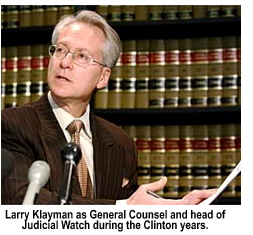 He
should have warned us to watch out for the criminal wrongdoing of
our presidents since they are financially beholden to the invisible
princes of industry and barons of business who have strived, since
1920, to build a seamless, socialist world government.
He
should have warned us to watch out for the criminal wrongdoing of
our presidents since they are financially beholden to the invisible
princes of industry and barons of business who have strived, since
1920, to build a seamless, socialist world government.
Rumors that the Clinton-Gore Campaign took illegal contributions from Riady's LippoGroup in 1992, and from agents of the People's Liberation Army [PLA] in 1996, were confirmed by the Thompson Committee Report and by an even more thorough investigation launched by Washington attorney Larry Klayman who, at the time, headed the DC watchdog group, Judicial Watch. During the first campaign Riady money appeared in the coffers of the Clinton-Gore Campaign.
The first confirmation that the PLA was attempting to buy members of Congress came in February, 1992 when then Congresswoman Nancy Pelosi [D-CA], then a critic of the People's Republic of China [PRC], testified in a congressional hearing on China that the PLA, through Chinese-American intermediaries, were making contributions to Democratic Congressmen and Senators.
The Los Angeles Times reported the story on February 17, 1992 but it was ignored by the people who should have been paying attention—the Bush-41 Justice Department. Criminal acts by Congressmen and Senators were barely a blip on the ethics radar screen. No one seemed to care that Congress' newest constituent was our enemy.
By 1996 the money was flowing like a raging river into the White House—directly from the PRC, through bundlers like Johnny Chung and John Huang, through straw donors like Maria Hsia and Charlie Trie, and through a series of 58 White House Coffees—each of which averaged $112 thousand. Most of those attending the Coffees were not American. The most notable Coffee was held on June 18, 1996 in the Map Room. It was dubbed the Kanchanalak Coffee—after PLA agent Paula Kanchanalak. (Kanchanalak would be indicted by a federal grand jury on 24 counts of election tampering, but would flee the country to avoid prosecution—as did several other agents of the PRC.)
The Kanchanalak
Coffee—the second of two Coffees held on June 18—was
opened by Don Fowler, Chairman of the DNC who introduced
Clinton, comparing him to Abraham Lincoln. At that point
Fowler turned the meeting over to John Huang who made
a pitch for money to the head of the CP Group of Thailand—in
Clinton's presence in the White House. 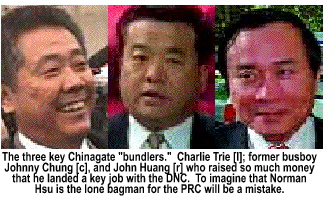 [Thompson
Committee Report at 212]. It is unclear from the Committee
Report if Fowler was still in the Map Room when the money
pitch took place, but logic suggests since the solicitation of money
from foreigners by a candidate for federal office (or his agent)
was criminally illegal, it would have been in Fowler's best
interest to leave before the money pitch was made.
[Thompson
Committee Report at 212]. It is unclear from the Committee
Report if Fowler was still in the Map Room when the money
pitch took place, but logic suggests since the solicitation of money
from foreigners by a candidate for federal office (or his agent)
was criminally illegal, it would have been in Fowler's best
interest to leave before the money pitch was made.
Huang told the Thai businessmen that "...Elections cost money, lots of money. And I'm sure that every person in this room will want to support the reelection of President Clinton." [ibid, at 213.] The CP Group executives later bragged that they were not shy in telling Clinton what they wanted in return for their "support." More US high technology exports to China. (Far Eastern Economic Review; Jan. 23, 1997) On the same day that Huang made his pitch for illegal money—and on the same day the Thai Group asked Clinton for more high tech exports—Congress was considering the Most Favored Nation status for China—pushed by Clinton who viewed the PRC as America's friend and trading partner. Well...at least China was his friend and trading partner.
What made the Coffees wrong—even those which solicited money from donors who could legally give—was that they violated Section 607 of Title 18 of the Federal Election Campaign Act of 1979 which made it a crime to solicit contributions or receive donations in any room of the White House occupied—at the moment—for the discharge of official duties of any federal employee or official. Since Clinton personally met the "coffee contributors" in the Map Room in his official capacity as the President of the United States, the Map Room was being used in the discharge of Clinton's duties as President. Thus, what happened there on June 18, 1996 was illegal.
The Democratically-controlled Congress—which was certain Jimmy Carter would not be reelected—enacted Title 18 specifically to prevent Carter's successor (whom they expected in 1979 would very likely be George H.W. Bush) from using the aura of the White House to raise money for his reelection. Under Section 607, not even members of the DNC could solicit donations in any room occupied, at that moment, for the discharge of official duties by any official of the United States government. The Clintons, obfuscating the fact that many of the contributors were foreign nationals who could not contribute under any circumstance, argued that because no actual money changed hands in the White House, what they were doing was not illegal.
Nevertheless, even without any evidence that solicitations took place in the other 57 coffees, the President, by his presence and participation in the Kanchanalak Coffee violated three federal laws. Clinton dismissed his actions by simply denying they were fundraisers. The White House argued that all of the Coffees were merely round-robin discussions with a myriad of people with different perspectives on the issues that face Americans every day. All of whom, by chance, left behind their pledges for from $15 to $50 thousand for the privilege of sharing that opinion.
Without excerpting the whole Thompson Committee Report, it's clear that the Clinton White House solicited and accepted illegal contributions from the People's Republic of China from 1992 until at least 1996. Hundreds of thousands of dollars of illegal Chinese money was refunded by the DNC in 1996-97 after it was revealed that its source was illegal. Why was the money illegal but not the conundrum of ways the Clintons used to rake in millions of dollars from a foreign country? The short answer is, every facet of Chinagate was illegal—if it was not high treason against the United States.
And why was Bill Clinton impeached only for a semen-stained blue dress and for lying about having sex with Monica Lewinsky if it could easily have been proven that he committed treason by accepting bribes from a foreign government? Because scores of Congressmen and Senators—on both sides of the aisle—included names like John Kerry, Ted Kennedy and Diane Feinstein—took illegal money from China. On August 30, 2007 Investor's Daily noted that "...Hillary wasn't measuring drapes in the White House when all this Chinese funny business was going on. She personally took checks from Chinese bagman [and former busboy] Johnny Chung when he visited the White House...Last decade, the Clintons took millions in laundered foreign campaign donations, mostly from China. Many of the bagmen were convicted. In fact, the Chinagate investigation successfully prosecuted 25 outlaw fundraisers for Bill Clinton and the Democrats. That haul came in spite of Janet Reno blocking investigators' efforts at the Justice Department. Heading the probe in the Senate was Fred Thompson. He was vilified by the Clintonites and their apologists in the media for conducting a witch hunt. Of course, he was right about the Chinese contributions all along."
In all, a total of 120 witnesses/co-conspirators either skipped the country, pleaded the 5th Amendment or used other legal devises to avoid testifying before a court or before the Thompson Committee or Judicial Watch. When the dust settled, 14 straw donors or bundlers were convicted in funneling what appears to be over $600 million to the Clinton-Gore Campaign and at least $200 million more to the DNC.
Because America did not hold the feet of Bill and Hillary Clinton and Al Gore to the fire, and criminally prosecute them for Chinagate I, we are now faced with Chinagate II—a full year before the Election of 2008. In the case of Gore—who is still a closet candidate for President, but who will likely win against any Republican when he finally throws his hat in the ring—it should be pointed out that two weeks after the Election of 1988, PLA agent Maria Hsia was arranging Al Gore's visit to the Fo Kuang Shan Buddhist Monastery in Kiaoshung, Taiwan. Once there, Gore would meet with Master Hsing Yun—also a PLA hireling and purported head of the PLA's spy system in Taiwan—where the funding of his 1992 race for the White House was discussed. Set into motion at that time were the fundraising events at the Hsi Lai Buddhist Temple in Hacienda Heights, California that Gore would later insist were nothing more than community outreach programs. If the American people put either Al Gore or Hillary Clinton in the White House when they should be putting them in the Big House, they will deserve precisely what they get—the loss of all personal liberty under the guise of more democracy for the downtrodden.
Chinagate II
On August 28 the Wall Street Journal broke the story that six members of one oriental family in Daley City, California without the financial means to do so donated between $213 and $260 thousand to Democratic candidates over the last two years. The William Paw family contributed $55,000 of that amount to the presidential campaign of Sen. Hillary Clinton this year. Over the last three years, they contributed $102,300.00 to the Senator.
.jpg) The
first red flag that the Paws may have been straw donors comes
from the low middle class appearance of their 1,280-square foot
lime-green home at 41 Shelbourne Avenue in Daley City. The second
red flag comes from the fact that 64-year old Paw, a USPS
union representative earns $49 thousand per year. Paw's wife,
Alice, claims to be a homemaker yet, in some media reports,
she is reported to be the owner of a gift shop. The Paws
have four children. One of them, Winkle, claims to be an
executive at a mutual fund company. Winkle Paw was involved
in at least one business venture with Hsu. The second works
at a local software company. The third is an "attendance liaison"
person with a Bay-area school board. .The fourth, a daughter, works
at a local hospital.
The
first red flag that the Paws may have been straw donors comes
from the low middle class appearance of their 1,280-square foot
lime-green home at 41 Shelbourne Avenue in Daley City. The second
red flag comes from the fact that 64-year old Paw, a USPS
union representative earns $49 thousand per year. Paw's wife,
Alice, claims to be a homemaker yet, in some media reports,
she is reported to be the owner of a gift shop. The Paws
have four children. One of them, Winkle, claims to be an
executive at a mutual fund company. Winkle Paw was involved
in at least one business venture with Hsu. The second works
at a local software company. The third is an "attendance liaison"
person with a Bay-area school board. .The fourth, a daughter, works
at a local hospital.
It is
unclear to everyone investigating the finances of the Paw
family how they could contribute $213 thousand for national candidates
and $14 thousand for statewide offices—a total of at least
$227 thousand. 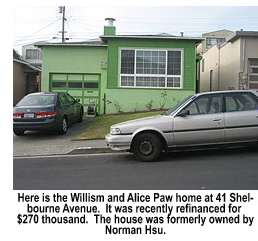 Records
also show that William and Alice Paw recently refinanced
their Daley City home—for $270 thousand. While the politicians
that have benefited from the Paws' largess would like the
American people to believe that the Paws refinanced their
home and, being loyal Democrats, donated the money to their favorite
candidates, sticking themselves with a new mortgage which, on their
household income, they could ill afford to pay. What the Paws
did is a typical straw donor transaction. The gifts to the candidates
appear to have roots. Paw refinances his home. Paw
is reimbursed for the contributions and, sometime later, quietly
pays off the mortgage. How does he gain? His house, which had a
mortgage on it when he entered into the agreement is now mortgage
free.
Records
also show that William and Alice Paw recently refinanced
their Daley City home—for $270 thousand. While the politicians
that have benefited from the Paws' largess would like the
American people to believe that the Paws refinanced their
home and, being loyal Democrats, donated the money to their favorite
candidates, sticking themselves with a new mortgage which, on their
household income, they could ill afford to pay. What the Paws
did is a typical straw donor transaction. The gifts to the candidates
appear to have roots. Paw refinances his home. Paw
is reimbursed for the contributions and, sometime later, quietly
pays off the mortgage. How does he gain? His house, which had a
mortgage on it when he entered into the agreement is now mortgage
free.
The donations the Paw family made to Hillary Clinton were funneled through Hong Kong businessman Norman Hsu. Hsu is a mystery man with no accessible "hard copy" past. Hsu claims to be a wealthy businessman from Hong Kong. He does not lease space in any of the office buildings he lists on his "resume," nor does he live in the elegant residential tower he claims as his current address. Hsu may be the first person in history who actually lives in his PO Box. New York Times reporters spent a week trying to find exactly where Hsu lives.
(Wonder if they tried the Beijing telephone directory?) Hsu popped up from obscurity around 1991 when he was arrested for engineering a Ponzi scheme. Hsu was charged with defrauding investors of over a million dollars in a scheme to sell latex gloves. (Wonder if that was his "apparel business?") Hsu pleaded "no contest" to the charge of grand theft—and vanished before his sentencing. Hsu was facing three years in prison when he skipped. He said he thought he was filing bankruptcy and didn't realize he had pleaded in a criminal matter. Hsu skipped town before his sentencing. Prosecutors now believe Hsu fled the country to avoid a three year prison sentence. What makes them so sure? Because after posting $2 million bail last week, Norman Hsu skipped again.
Hsu's lawyer, Jim Brosnahan, was expected to ask San Mateo Superior Court Judge Robert Foiles to reduce his bail, arguing that Hsu was not a flight risk. However, when Hsu failed to appear at his 9 a.m., Sept. 5, 2007 hearing before the judge, Foiles forfeited his bail and issued a bench warrant for Hsu's arrest. I suspect he's going to have to serve the warrant in Beijing.
Hsu is reminiscent of the Clinton-era bundlers who used straw donors to launder Beijing yuan into American dollars. Is Norman Hsu this generation's John Huang? Not hardly since John Huang, who was at one time a Commerce Department employee, had a top secret security clearance that he was allowed to keep even after he moved to the DNC. Hsu, a convicted felon, should not have even been able to get a pass granting him access to the White House grounds.
When the flack about Hsu first surfaced a week ago, and before Hillary donated the $23,000 she claims she received from him to charity—not the $133 to $500 thousand her campaign has received from Hsu since 2004—the former First Lady and co-president with her husband distanced herself from Hsu not because he's a foreign national who cannot legally contribute money to her campaign, but because he was guilty of committing a felony and was considered to be a fugitive from justice. So, apparently, are Senators Barack Obama [D-IL], Joe Biden [D-DE], Ted Kennedy [D-MA], and Congressmen Michael Honda [D-CA] and Joe Sestak [D-PA]. Even Senator-wannabe Al Franken (who is trying to unseat Norm Coleman [R-MN]) said they would divest their campaigns of Hsu money. (Hsu contributed to Obama's 2004 Senate campaign as well as his current presidential action committee. Hsu also donated $43,700 to the Democratic Senate Campaign Committee and $2,500 to the Democratic Congressional Campaign Committee. Both groups—once again, because of his standing as a fugitive, not because he is a foreign national who cannot contribute—have said they plan to donate his contributions to charity.)
The US Justice Department is now investigating Hsu on possible charges that he was reimbursing others for making hundreds of thousands of dollars in political contributions. The Wall Street Journal reported on Aug. 29 that Hsu reimbursed the Paw family $225 thousand, Norman Hsu will prove to be just the tip of the iceberg just as John Huang, Johnny Chung, or Charlie Trie, or Maria Hsia, or Paula Kanchanalak or any of 120 straw donors or bundlers that fueled the Clinton juggernaut in 1994 would have, singularly, been the tip of that iceberg. The Norman Hsu connection was uncovered only because the Beijing-bundler ran afoul of the law and his past deeds uncovered his current ones. How many other bundlers from Beijing are working on the Clinton or Obama campaigns? Working in the same manner as the PLA financed the separate campaigns of Bill Clinton and Al Gore until they joined together as a team at the urging of the Chinese campaign funders in 1992.
While several big money Clinton donors said they did not believe the Hsu scandal will harm Hillary Clinton's campaign unless problematic fundraising or compromised donor gifts emerge that would raise questions about the integrity of Hillary's donor vetting. "Everyone is trying to imply that its Chinese money," said John Catsimatidis, a leading Clinton fundraiser in New York. "It's the Al Gore thing all over again. But I haven't seen any proof of that." Actually, John, it was the White House Coffee thing—with Chinese nationals scrambling to get Beijing's boy elected in 1992 and reelected in 1996. Al Gore was just part of the problem. Two-thirds of it was the ethics-challenged President and First Lady of the United States.

Copyright © 2009 Jon Christian Ryter.
All rights reserved.


